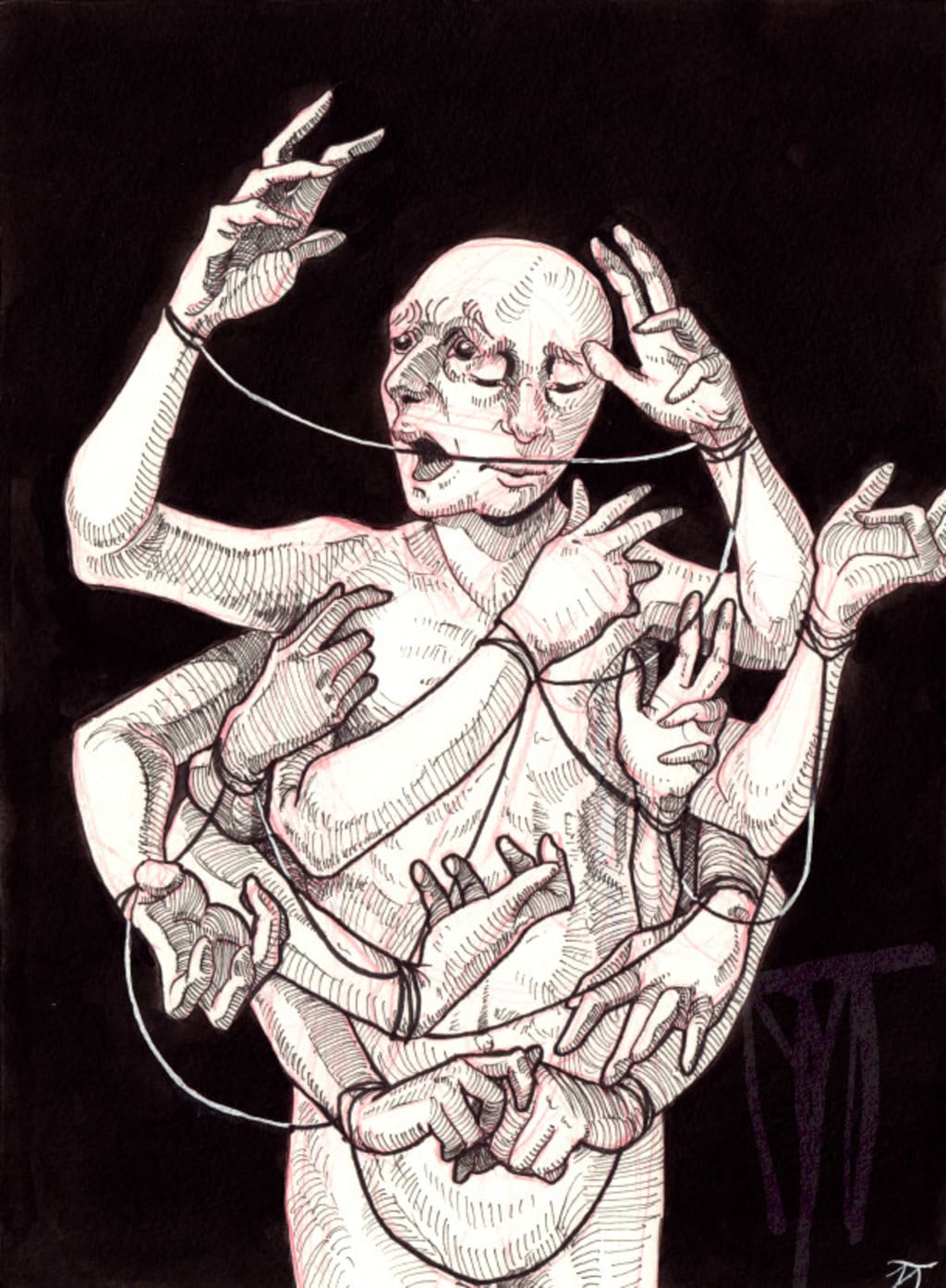
* This article was originally posted on Medium.
Are you someone who overthinks, stresses, and worries over everything?
If you answered yes to the question, this article is for you. As an experienced over-thinker, I can tell you three things: it’s exhausting, it's unnecessary, and it's costly.
Despite knowing all of these things, I still seemed to worry about everything. My overthinking problem reached its peak in college. In my first year, I was a full-time student-athlete. At the time, I strove to get the best grades and be the best in my sport.
I was an overachiever; I spent a lot of time studying, worrying and stressing. I pushed myself to meet the expectations of my family, society, and myself.
I had a packed schedule that consisted of more than six classes. I was at school six days out of the week, constantly pushing myself to go above and beyond.
In the beginning, I was anxious to get started. Over time that feeling of joy, passion, and excitement disappeared. Going to school used to be exciting and fun, and then suddenly it wasn’t.
That year I had the highest grades I ever achieved, and yet it wasn’t enough. This experience was like running a race with a backpack full of rocks, and somehow the finish line kept getting farther and farther away.
I was stuck in a corner. I was restricted mentally, physically, and emotionally. I worried about my grades, my future, the past, the present, society, and everything.

I used to think things like, —
What if my professor doesn’t like what I wrote?
They gave me a bad grade last time; do they not like me?
If it isn’t good enough, then I’m probably just stupid.
If I’m stupid, then there’s zero chance of me going anywhere good in life.
These thoughts were the ones that kept me up at night. It drove me to exceed expectations out of fear. I wanted to succeed so badly that I put my emotional and mental health at risk.
I was rotting from the inside out, at least, that’s what it felt like. The only thing that kept me afloat was the approval of others. There were days when I didn’t receive the achievements I’d hoped for and in turn, I punished myself.
***
In my second year, while I was studying, I noticed a tingling underneath my left hand shoulder blade. I realized that when I studied that sharp tingle would itch and itch.
I scratched away at it for weeks before I went to get it checked. When I found out what it was, I wanted to fall apart. The doctor had told me it was shingles, and the cause was extreme stress.
I sat there speechless, and my mind went blank. That was the first time that my mind went silent in a long time. When I walked into that doctor’s visit, I was already worried about a lot of things. By the time I walked out I was mentally drained.
I was exhausted, frustrated, confused, and ashamed. Before I started college, I never considered myself to be a worrywart. I was a chill, fun, and relaxed person. Somewhere along the way, I became someone different.
I had developed a terrible habit, and it cost me my happiness. After that doctor’s visit, I thought about how my life felt for the first time. Even though I had the best grades, I wasn’t happy.
I wasn’t happy with my body, mind, and soul. My life became an obsessive game that was only concerned with winning and being the best.
The same thoughts kept running through my head, —
Since when did life become a rat race?
When did I turn into someone that I could no longer recognize?
Is being the best worth sacrificing my mental, physical, and emotional health?
It took two years of torment, punishment, and deterioration to come to this solid conclusion:
Life was a terrible experience because I made it that way. My mind was an even darker place because I allowed it to be.
I chose to worry about things that could never happen. I cared about the judgment, expectations, and opinions of others. I chose to carry the weight of everything when I didn’t have to.
***

To ditch that exhaustive mentality, I did four things:
(1) Believed that I could overcome the state of mind through mindfulness.
After that doctor’s visit, I spent the next month challenging myself to be aware of my thoughts, feelings, and behaviors. I started writing down what I noticed in myself and others.
In the first month, I wrote things like, —
Worried about mom being okay at her new job.
Worried about my sister making friends in high school.
Worried about my brother getting good grades.
Scared that my nana won’t recover from her sickness.
Afraid that I’m not enough for other people.
I constantly feel like everything is hanging by a thin thread.
All of these things concerned other people. I constantly worried and prioritized the well-being of others instead of mine. My ultimate decline occurred because I wasn’t willing to put myself first.
My stress, anxiety, and fear were created from the power I gave it.
The next year, I studied and participated in various mindful techniques to gain awareness of myself, my beliefs, and my perspectives.
***
(2) Understood that life is more than achieving.
For the remainder of the semester, I treated myself more. Instead of maintaining an obsessive study routine, I took time to do things I loved doing. I studied things I liked, took workout classes, and spent time developing new self-love routines.
Over time I realized that I didn’t even like my field of study. I was concerned with other people’s versions of success. I was caught up that I placed myself on the hamster wheel like everyone else.
When I got off the wheel, I noticed the beauty of everyday life. I fell in love with the sun, the moon, and the stars. I paid attention to the little things that made life beautiful.
I concluded that life wasn’t about succeeding; it was about experiencing and being in the present moment.
I ended the semester with good grades, but not all A’s. The following year, I planned to move out of state to live with my best friend and grow even more.
***
(3) Learned how to live for myself instead of others.
In the past, my entire purpose was to live for my family. I wanted to go to school, get a good job, and make good money — not for myself but for others. My sole purpose was to achieve and earn for the sake of my family.
Coming out of this cycle was difficult. When I attempted to break away from my family, things were put into better perspective. I planned to move but my family was against it.
They said I should stay to help my mom and siblings. Every excuse they gave made things crystal clear. They told me I was selfish and tried to convince me that what I was doing wasn’t good because it didn’t prioritize others first.
When I set healthy boundaries with others and myself, my life changed for the better.
***
(4) Concluded that control is an illusion.
Through mindful meditation practices, I learned that my stress, anxiety, and state of mind were created by me. I worried about the quality of other people’s lives and stressed over things I had no control over.
In college, I spent an unnecessary amount of time jumping to conclusions. This experience was comparable to actively stepping into possible scenarios of what could happen. Most of the time, these scenarios were always the worst cases.
My mind was consistently attempting to predict the future. The more I analyzed this behavior, I understood that I wanted a guarantee. Every step I made was to ensure that things would work out.
In life, so many things can change in an instant. We see it all the time, on the news, on social media — everywhere. Anyone can be the best, do all the right things, walk the straight path, and still wind up elsewhere.
After I came to this realization, I decided to live in the moment because nothing in life is guaranteed.
Why spend my time worrying, when this moment can be the last moment I experience?
Adopting this mentality helped me live a more appreciative life.
***
Overcoming a negative mindset is difficult.
It took me years to develop an understanding, let alone put it into practice. Positive change takes time, but the sooner we start, the faster happiness will come.
In the beginning, I assumed there was no way out. I told myself that I was built a certain way, and I wasn’t able to change. This mindset restricted the possibility of living a happier and healthier lifestyle.
Positive change is determined by daily choices. Today, decide to set yourself free.
About the Creator
Jasmine
Mindful perspectives, strategies, and solutions.






Comments
There are no comments for this story
Be the first to respond and start the conversation.